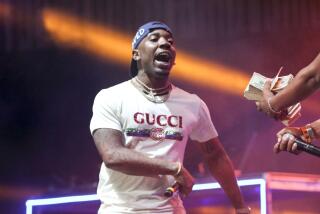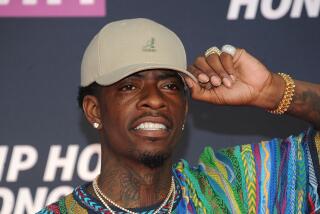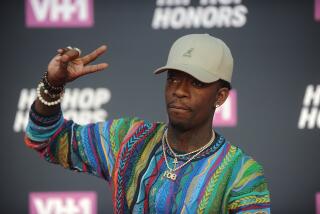B.I.G.’s family denies his role
The family of the late rap star Notorious B.I.G. denied Friday that he played a role in the murder of rival Tupac Shakur.
The family issued the statement in response to a Los Angeles Times story that reconstructed the killing of Shakur in Las Vegas in September 1996. The article reported that Shakur was attacked by members of a Compton gang called the Southside Crips, and that Notorious B.I.G. provided the gun and agreed to pay the gang $1 million.
Notorious B.I.G., whose real name was Christopher Wallace, was shot dead six months later in Los Angeles. His killing remains unsolved.
In the statement, Wallace’s family described the Times story as “irresponsible journalism.”
“Christopher Wallace was at his home in New Jersey on the night of Tupac Shakur’s murder, with friends who will continue to testify for his whereabouts since he is unable to defend himself,” the statement said. (The complete text is available at www.latimes.com /statement.)
An attorney for Wallace’s estate, Londell McMillan, also criticized the article. “The story is patently false,” McMillan said. “There have been numerous witnesses who have surfaced that clearly put Christopher in New York and New Jersey on Sept. 7, 1996,” the night Shakur was shot.
One of Wallace’s friends, rapper Lil’ Cease, asserted Friday that he and Wallace were at Wallace’s home in Teaneck, N.J., that night.
The Times account was based on court documents and interviews with police investigators and gang members, including witnesses to the crime. It said Wallace was in Las Vegas on the weekend of the shooting, registered at a hotel under a false name.
Shakur, other rap-industry figures and Los Angeles gang members also were in town, to attend a heavyweight boxing match.
Wallace was closely tied to the Southside Crips, whose members often provided security for him.
Wallace and Shakur, once close friends, had become bitter rivals who exchanged insults and threats on recordings, in concerts and at music-industry awards shows.
Before publishing its story, The Times sought comment from Wallace’s mother, Voletta. Through a lawyer, she declined to comment.
More to Read
Sign up for Essential California
The most important California stories and recommendations in your inbox every morning.
You may occasionally receive promotional content from the Los Angeles Times.










